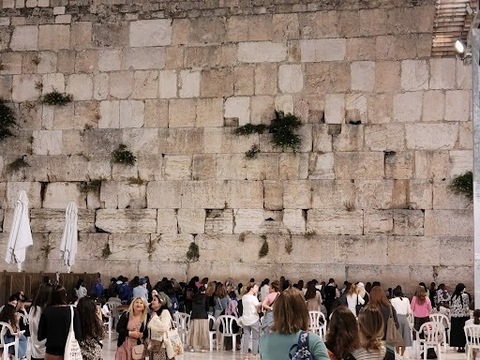The recent op-ed by Salma Sheikh, published Dec. 1, attempts to draw connections between free speech and the limitations imposed on certain pro-Palestinian groups.
While free speech is a fundamental right, advocating for violence or harm toward any group, including the call for the genocide of the Jewish people, goes beyond the boundaries of constructive discourse. The object of this op-ed is to both respond and advocate for media literacy programs to help people discern between accurate information and disinformation.
Specifically, I take issue with the paragraph in the aforementioned op-ed that states, “Student organizations who support Palestine are demonstrating for the rights of families, children and a society that has endured nearly 75 years of unrelenting violence and aggression.” Reasonable and informed readers will take issue with the implication that this is a one-sided conflict in which Israel has, unprompted, fomented violence and aggression against the Palestinian people. This is factually untrue. But in addition, it’s important to understand that the explicit focus on 75 years is woefully incomplete. Pro-Palestinian groups like to mention “75 years” to make their case, but in order to bring about a more complete perspective and a better understanding of the situation and its history, a couple of other dates are significant as well.
Many scholars identify the beginning of the Arab conflict with the Jewish population with the fall of the Ottoman Empire in 1918, after which the British Mandate of Palestine shortly began. It was under the British Mandate that violence in the region dramatically escalated. One key date is August 1929: Arab residents of Hebron led a rampaging massacre against the existing Jewish community —killing and raping men, women and children in homes, schools, synagogues and hospitals. Sixty-seven Jews were murdered. Atrocities were committed and properties were looted. Jews had lived in Hebron for approximately 8 centuries, but most left the area in the aftermath of the massacre. Some scholars (notably, Hillel Cohen-Bar) identify this as a point of no return in Arab-Israeli relations.
Another important date to note is 1947, when the United Nations recommended the creation of both a Jewish state and an Arab state in Mandatory Palestine. This Arab state would have been a national home for Palestinians. The Arabs (the Arab Higher Committee and the Arab League) completely and unambiguously rejected the General Assembly’s partition plan. Instead, in 1948, with the establishment of the State of Israel, fighting began with attacks by irregular bands of local Arabs. An invasion by Arab armies from Lebanon, Syria, Iraq, Jordan and Egypt followed this action. The Arabs lost the 1948 war, and an estimated 700,000 Palestinians fled or were expelled, becoming refugees. Other than Jordan, 21 Arab countries refused to take in these refugees, refused to give them citizenship, and kept many in refugee camps. In the next few years, Arab countries expelled the bulk of their Jewish populations (about 900,000). These Jewish refugees were absorbed and integrated into all facets of society in the State of Israel.
The 1948 war marks the beginning of the “75 years” highlighted in the previous op-ed. And it’s true that, since 1948, there have been several conflicts and a lasting peace has not yet been achieved. Notably, however, neither Gaza nor the West Bank have been “occupied” since 1948, or for the misleading “75 years.” Gaza was briefly occupied by Israel in 1956-57, but was otherwise under Egyptian control from 1948 to 1967. Israel captured Gaza as a result of the 1967 war. In 1994, as a result of the Oslo Accords, Israel began transferring control to the Palestinian Authority, and in 2005 Israel completely withdrew from Gaza and dismantled all existing Jewish settlements. Unfortunately, in the last 18 years, Gaza came under the control of the terrorist organization Hamas. Thus, while it is true that Israel has at times occupied Gaza, it has by no means been for 75 years — and Israel’s withdrawal in 2005 was in pursuit of peace.
Likewise, the West Bank was under Jordanian control from 1948 to 1967 and has been controlled by the Palestinian Authority, or PA, since 2005. In 2005, Israel transferred to the newly created PA security and civilian responsibility for many Palestinian-populated areas of the West Bank. The PA is a dictatorship under Mahmoud Abbas, who was elected as president for four years and is still serving today.
This brief history brings us to the state of Israel on Oct. 7, when Hamas attacked Israel from Gaza. Israel is currently waging a war of defense to protect its civilians from future such attacks. It is extremely troubling to observe the demonstrations with antisemitic slogans, the many antisemitic incidents occurring globally, the resurrections of antisemitic tropes and the falsehoods and disinformation surrounding the conflict. Thus, it is important to promote education about the historical context of antisemitism and its various forms, including violence against Jewish students on college campuses and attacks on Jewish properties by pro-Palestinian groups, as related to the Oct. 7 genocidal attack on Israeli civilians. I also aim to promote and encourage more informative programs, seeking to dispel myths and misconceptions regarding this ongoing conflict.
Samuel Rabino is a professor emeritus of marketing and international business and can be reached at s.rabino@northeastern.edu.









